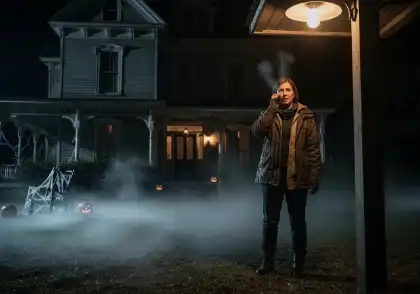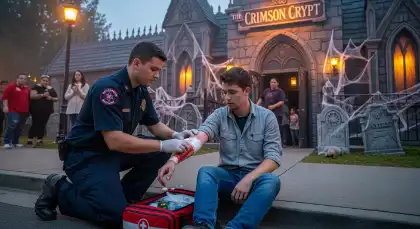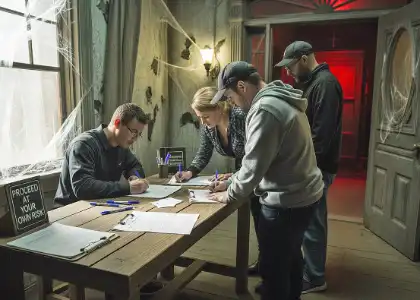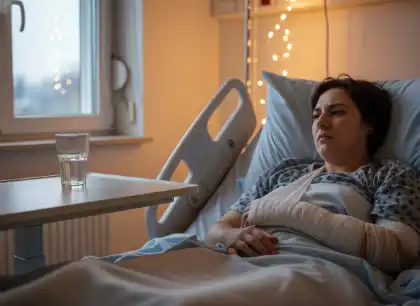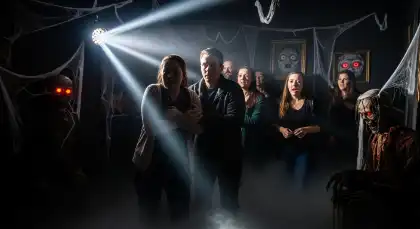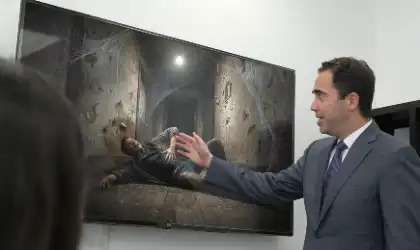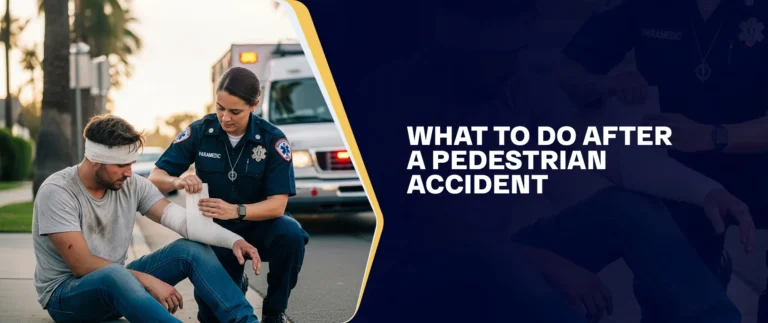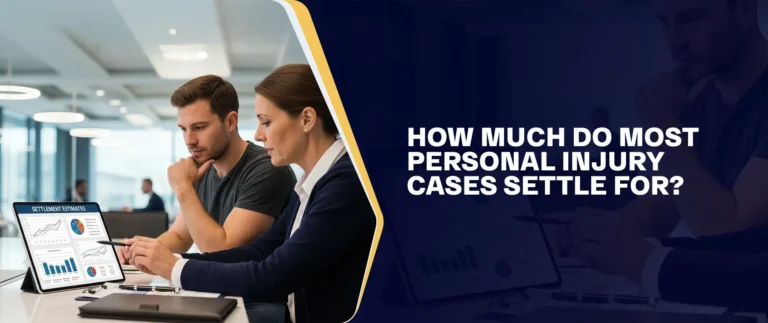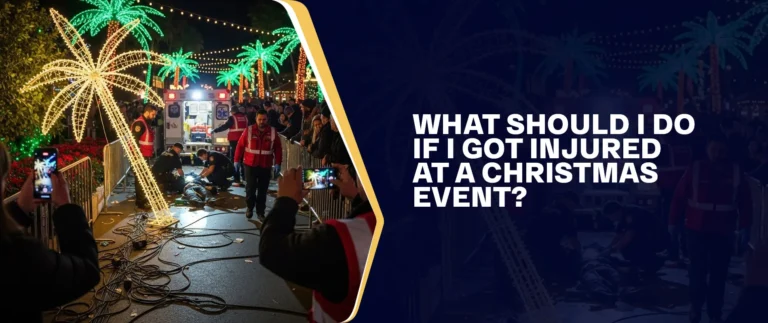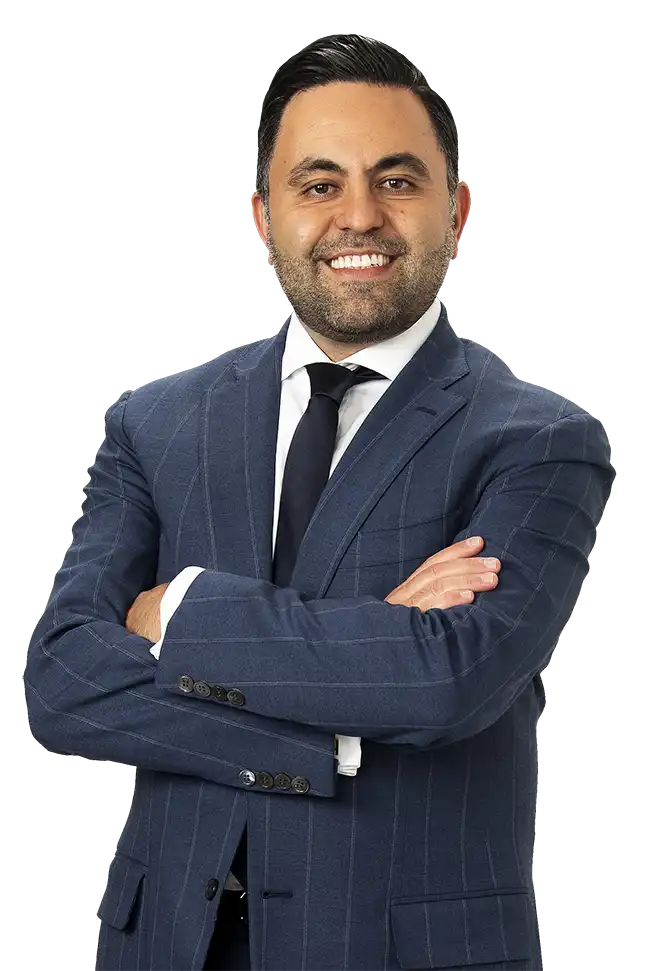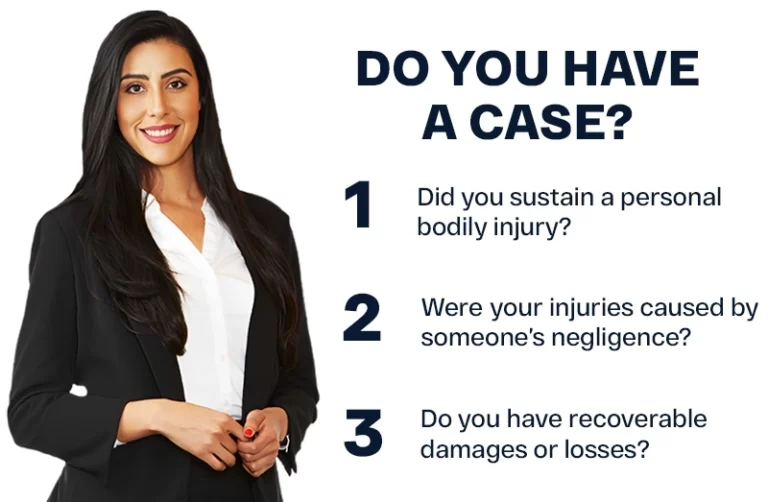TL;DR: Haunted house operators are typically at fault if a prop injures a guest. However, other parties may also bear responsibility. In some cases, liability may also extend to manufacturers of defective props or property owners who neglect to maintain a safe environment.
Table of Contents
When a haunted-house prop injures a guest, the responsibility primarily lies with its operator. However, operators are not the only ones potentially responsible for haunted-house prop injuries. Depending on the situation, one or more of the following may be at fault for a guest’s injury:
- The haunted house operator
- Property owners
- The haunted house’s employees
- A defective prop’s manufacturer
Some haunted houses operate all year, while others open during holidays like Christmas and Valentine’s Day or during school vacation periods (like Scream Break during spring break). However, haunted houses are most popular in the fall, usually opening in late September or early October. For these attractions, the weeks leading up to Halloween are among the busiest times.
Some haunted houses use props and effects, as they can enhance the overall experience. However, attractions should only use them when all proper safety measures are in place. Although visitors sign waivers and accept the risk of a scary experience, they do not assume the risk of unsafe conditions caused by a lack of proper care and maintenance.
These waivers also do not eliminate all legal responsibilities of the other party. For example, operators and property owners still have a duty to maintain their premises in a reasonably safe condition. As such, they could be accountable if an injury results from their carelessness.
Sharp, defective, or poorly secured props might injure haunted house enthusiasts. A 2015 incident at this Roseville attraction serves as a good example. CBS News reported that an actor, following a guest, held onto the house’s structure. A piece of the house’s structure broke off and struck the guest on the head.
If something similar happens to you or a haunted-house prop injures you, you may be able to file a personal injury case. To help you identify who may be responsible, call AK Law Firm at (888) 488-1391. Learn about your options in a free initial consultation.
Who Is At Fault If A Haunted House Prop Causes Injury?
Those seeking a fun and scary experience enjoy haunted houses. During the fall season, California offers many haunted attractions. Visitors don’t need a car to explore Los Angeles and other areas with these attractions, as they’re accessible via public transit or ridesharing services. They typically star in large-scale seasonal events. You might think of Halloween Horror Nights at Universal Studios Hollywood and Fear Overload Scream Park.
The Golden State also boasts permanent attractions, including the Winchester Mystery House and Reign of Terror Haunted House. Despite their popularity, accidents can still occur at these attractions.
Haunted houses use a wide variety of props to create an immersive and fear-inducing atmosphere for guests. From simple decorations to complex animatronics, these props make haunted houses more realistic and add more fun. However, they can be dangerous if not properly maintained, installed, and inspected.
Depending on how the prop injury happens, the responsible parties may include:
The Haunted House Operator
Haunted house operators have a legal responsibility to maintain their premises in a reasonably safe condition. They also have a responsibility to secure props and train their staff.
Suppose a haunted house uses animatronics or mechanical props. In that case, operators must ensure that they’re functional and in good condition. Operators must also ensure that sharp or hazardous objects are properly padded or kept out of reach. If they fail to fulfill these responsibilities and a guest is injured as a result, they may be held liable for the injury.
The Haunted House’s Property Owner
Like operators, property owners have a legal obligation to maintain a safe environment for guests. Generally, this means they must address or warn guests about hazards that may cause injuries.
Say an attraction uses a fog machine to add some creepy ambiance to its rooms. If this prop malfunctions, it might leak. Now, if the spill causes a slip-and-fall accident, but uneven flooring contributed to it, property owners may share responsibility. You may have a valid premises liability claim if:
- They were aware of the hazard.
- They left the hazard unaddressed.
- They failed to warn guests about this hazard.
Property owners may also be liable if they were unaware of the danger but reasonably should have known about it.
Haunted House Employees
Haunted house employees can be held responsible for a prop injury if they are careless in the use of a prop. However, employers usually absorb this liability.
Suppose an operator failed to train an actor properly. If that employee ends up injuring a guest with a prop, the operator could be held accountable. Here, the legal concept of vicarious liability would apply. In California, this legal principle potentially allows injured victims to sue a company for the actions of its employees.
However, an employee at a haunted house could also face direct responsibility. For instance, they might deliberately use a prop to injure guests. Personal reasons could have motivated this intentional act, which the employer could not have anticipated. Such cases involve a complex analysis of the facts, and a personal injury lawyer can help clarify a victim’s rights.
A Prop’s Manufacturer
Did a defective prop injure you? A haunted house’s operator, property owner, or employees likely won’t be responsible. That’s especially true if they used the prop as intended. Instead, fault may lie with the prop’s manufacturer or even its retailer.
In this case, California’s product liability law would apply. An entity that designs, manufactures, or sells a defective product is strictly liable for injuries caused by that product. In other words, victims don’t have to prove negligence to file a product liability claim.
How Haunted-House Props Can Cause Accidents
Paying attention to your surroundings is one of the most effective ways to stay safe. However, that’s easier said than done at a haunted house. These attractions specifically aim to scare guests. Enjoying the thrill of the moment can make it challenging to spot and avoid potential prop hazards.
Haunted-house prop injuries may be caused by:
- Clutter — Decorations left on the ground could lead to slip-and-fall accidents. Think streamers, confetti, and candles.
- Exposed Wires & Cables — These can similarly pose trip hazards. Haunted houses that utilize electric props, such as fog machines, speakers, and black lights, should organize their wires and cables for safety. They can tape them along walls so they’re out of the way.
- Flashing Lights — These could make it difficult for visitors to see where they are going. Guests may accidentally fall or hit something.
- Mechanical Failures — These may cause injury to guests if they occur during rides. Haunted houses with such attractions should conduct regular maintenance to prevent accidents.
- Manufacturing Flaws — Defective props may injure guests, even if haunted house employees use them as intended.
- Poor Construction — For example, stationary props could injure guests if poorly secured to a haunted house’s walls or ceilings.
- Falling Objects — Many haunted houses hang props, like chandeliers and other spooky items, overhead. These can cause head injuries or worse if they fall on someone, just like the horrific accident that happened at Coachella 2019 that resulted in a severe TBI.
Common Injuries Sustained By Guests, Workers, And Actors
Haunted houses often employ a wide range of props to immerse guests. However, they can cause various types of injuries if proper safety measures are not in place. They might injure guests or employees of the haunted house. Some common injuries sustained by guests, workers, and actors include:
- Neck and back injuries
- Traumatic brain injuries
- Spinal cord injuries
- Broken bones
- Dislocations
- Lacerations
- Sprains
- Nerve damage
- Muscle injuries
- Knee and ankle injuries
- Burn injuries
Protections For Haunted House Employees
Workers’ Compensation Laws
Under the California Labor Code, employers need to provide workers’ compensation coverage for their employees. This code also applies to haunted house operators.
Workers’ compensation laws also apply to seasonal horror attractions. In California, temporary workers typically enjoy the same rights and benefits as other employees. If a prop injures them, they may also be eligible to file a workers’ compensation claim for related medical expenses. These may include medical and rehabilitation treatments, such as chiropractic sessions for back injuries.
Workplace Requirements For Haunted Houses
Many haunted house workers are considered seasonal employees. In other words, attractions only hire them for a few weeks or months out of the year. However, they still have the right to a safe workplace.
That’s why the Occupational Safety and Health Administration (OSHA) requires employers to establish or update operating procedures. Employers must also provide safety training for their workers.
Safety training may help operators and employees prevent accidents involving haunted-house props. Here are some general work practices that it can cover:
- Lifting procedures
- Knowledge of exits
- Medical and first aid procedures
- Evacuation plans
- Handling flammable or toxic chemicals
Do you have reason to believe your working conditions are unsafe or unhealthful at your haunted house? You can inform your employer about your concerns. You may also file a confidential complaint with OSHA. This process will prompt a workplace inspection.
Assumption Of Risk Doctrine: Does It Really Protect Haunted House Operators?
Haunted houses are supposed to be frightening. Guests voluntarily agree to be scared by the attraction and its employees. As a result, some personal injury claims for haunted house accidents get barred under the doctrine of primary assumption of risk.
However, that doesn’t necessarily mean you can’t pursue compensation after a prop injury. The assumption of risk doctrine may or may not apply, depending on the facts of your case.
Accepting Certain Risks
Certain activities come with specific risks. For example, you’ll likely be scared or startled at a haunted house. If you visit one, you’re voluntarily accepting that these scenarios can happen.
If one of those risks causes you injury, you may not be able to file a claim for it. The assumption of risk doctrine could apply if you ran out of fear and fell, for instance.
Primary Vs. Secondary Assumption Of Risk
Generally, the assumption of risk doctrine has two elements:
- Primary Assumption — You voluntarily engage in an activity with its known and obvious risks. It’s essentially a form of consent and is why haunted house guests often sign waivers.
- Secondary Assumption — You engage in an activity despite knowing its potential hazards. For example, you notice a loose handrail on a ramp and still choose to use it. When it detaches and causes you to fall and get injured, the secondary assumption of risk may be used against you.
The Role And Limits Of Haunted House Waivers
If you’ve been to a haunted house, you may know that operators often ask guests to sign waivers before entering. These disclaimers aim to protect operators from liability in the event of certain accidents occurring within the premises. Attractions offering “extreme” experiences often make visitors sign longer waivers. Take McKamey Manor, for example, one of the “scariest” haunted houses in the country. Its waiver is over 40 pages long!
Though they can be comprehensive, these waivers do have their limits. If gross negligence or intentional harm caused your haunted-house prop injury, you may have grounds to file a claim.
Suppose an attraction uses large props. If they’re improperly fastened or secured, they could fall and hit you. In this scenario, you could potentially pursue compensation for your injuries. Arash Law’s attorneys can help explain whether a waiver is applicable in your specific case. They can also tell you if you may have the right to challenge it.
Proving Liability After A Haunted-House Prop Accident
To validate your haunted-house prop injury claim, you need to prove the at-fault party’s liability. Our personal injury lawyers can help by establishing their negligence. This process involves proving these four elements:
- Duty of Care — The at-fault party owed a legal duty of care to you as a guest. In this case, haunted house operators and their staff must use props safely or as intended.
- Breach of Duty — The at-fault party breached its duty of care. This breach could occur if the haunted house failed to verify that props were properly installed and functioning.
- Causation — This breach directly contributed to the accident that resulted in your injuries. For example, a haunted house continued to use a mechanical prop without conducting routine maintenance. It then malfunctioned, injuring you.
- Damages — You incurred specific losses as a result of the accident. You could prove these by presenting medical bills or lost wages caused by your injuries.
What To Do After A Haunted-House Prop Accident
After a haunted-house prop injury, your safety should be your priority. Taking certain steps can accomplish that while also protecting your potential right to file a claim. You can follow these steps:
Report The Incident To The Haunted House’s Staff
Address your immediate medical needs. Then, inform the attraction’s management of your injuries. They can help formally document and establish a clear timeline for your accident. Their incident report must include details about the circumstances surrounding your injury. It could explain what may have caused it, such as malfunctioning props. Ask for a copy of this report. It could serve as supporting evidence for a future claim.
Gather As Much Evidence As You Can
The more proof you gather, the better an attorney can analyze your case. If you have a valid claim, this evidence can also support it. You can collect:
- Photos and videos of your injuries and the prop that injured you.
- Surveillance footage from the haunted house
- Eyewitness contact details and testimonies
- A receipt proving you purchased a ticket for the haunted house.
Seek Medical Attention
Go to a doctor as soon as possible. That way, you can get treated immediately. Doctors can also spot injuries that aren’t readily apparent, so they don’t worsen. A hospital visit can help document the extent of your injury and connect it to the accident involving a haunted-house prop. It could also prove that your injuries were serious enough to warrant immediate medical care.
Consult A Personal Injury Lawyer
An attorney can review your case. They can then explain your legal rights and options to help you decide what to do next. Our experienced lawyers handle premises liability and product liability claims. You can schedule a free initial consultation so we can offer insights after your haunted-house prop injury.
Potential Damages After A Prop Injury
With a valid claim, you can seek compensation for your injuries and other losses. These could include economic (tangible) or non-economic (intangible) damages, such as:
- Medical Expenses — These cover current and future costs associated with treating your prop injury. You can include expenses for medication, surgery, physical therapy, and rehabilitation.
- Lost Income — Suppose haunted-house prop injuries cause you to miss work. In that case, you could pursue the value of the wages you could have earned during your recovery.
- Pain and Suffering — You can seek compensation for the pain and suffering you may experience because of a prop injury. It may include emotional trauma, PTSD, anxiety, or depression.
When you get injured because of another party’s carelessness, you may be able to seek various types of damages. Severe injuries usually lead to higher compensation, but the potential value of your claim will depend on the specific facts of your case.
Safety Tips Inside Haunted Houses
There are also certain precautions you can take to avoid being injured by a haunted-house prop. Here are a few:
- Follow Safety Warnings — Pay attention to staff warnings about possible dangers. If a prop has a “don’t touch” sign, then don’t touch it.
- Wear Appropriate Attire — Opt for closed-toe shoes and clothing that fits snugly. They’re less likely to snag on props.
- Walk, Don’t Run — Even if you’re scared, resist the urge to run. Walking can help you avoid slipping, falling, or hitting something.
- Know Your Limits — You can always ask staff to escort you out at any time. Knowing when to leave can help you avoid exacerbating issues like heart conditions.
Frequently Asked Questions (FAQs) About Haunted House-Related Injuries
It’s completely natural to have questions or seek free accident lawyer advice after sustaining injuries in a haunted house. You may want to know what happens next or what options are available to you. Here are answers to some of the common inquiries people typically have about these incidents. If you have other concerns, you may visit our FAQ page or call us at (888) 488-1391 for assistance.
What If Another Guest Injures Me In A Haunted House?
In a haunted house, injuries are not only a result of unsafe conditions. The haunted house operator must ensure the safety of the premises. Still, guests should also behave responsibly and avoid disrupting others.
In some cases, other guests may panic and push you, leading to an injury. If this happens, they may be liable for your injury.
However, even when a guest’s behavior directly causes an injury to another, the haunted house operator may still share some responsibility for the incident. If the attraction is too crowded or the operator fails to manage the flow of people, both the guest and the operator may share liability.
What Are My Rights If I Sign A Waiver And Get Injured At A Haunted House?
When you visit a haunted house, you often need to sign a liability waiver. This waiver states that you won’t hold the operator responsible for any injuries that may occur during your visit. It’s worth noting that signing it doesn’t mean you lose all your rights if you get hurt.
What if the operator claims you ‘assumed the risk’ by signing a waiver? Waivers can limit the operator’s responsibility for some injuries. It doesn’t automatically free the operator from responsibility for gross negligence, recklessness, or willful misconduct.
Haunted house operators must ensure the safety of their visitors under premises liability law. Even if you signed a waiver, you might still have a claim if your injury was due to unsafe conditions or the operator’s negligence.
For instance, you might have a valid claim if the operator:
- Failed to maintain safe conditions, resulting in your injuries.
- Was unable to train or supervise staff, leading to unsafe actions by actors or employees.
- Used dangerous props or effects without following safety precautions.
- Ignored complaints or did not issue warnings about hazards.
Can A Haunted House Be Held Accountable If A Malfunctioning Prop Injures Me?
Yes, a haunted house can be responsible if you get hurt by a faulty prop. Like any business, haunted house operators must prioritize the safety of their guests. If a prop fails and causes injury, the individuals responsible could face liability under premises liability or negligence laws.
However, other parties may also be held liable depending on the circumstances:
- Vendors or Contractors — An outside vendor may have designed, built, or installed the prop. If the malfunction resulted from poor workmanship or a design flaw, they could be held accountable.
- Employees/Performers — Generally, an employer is liable for the negligence of an employee. However, an employee may be held responsible if their actions exceed their job scope or involve intentional misconduct.
- Product Manufacturer — You may also wonder, “Does product liability let you sue a manufacturer in California?” If a defect in the manufacturing process caused the malfunction, a product liability claim might be filed against the manufacturer.
What If The Haunted House Operator Is Not Insured?
If the haunted house operator lacks insurance and you sustain an injury, the situation becomes more complicated.
Initially, your health insurance will likely cover your medical expenses. Afterward, you could ask your insurer to help recover costs from the haunted house operator.
If the operator doesn’t have insurance or only has limited coverage, you may have to sue them to pursue costs like medical bills, lost wages, and pain and suffering. This process can be time-consuming and challenging.
You might think to yourself, “I need a personal injury lawyer.” In these situations, you might. An experienced attorney can guide you through the legal process. They will help you explore other legal ways to seek compensation. After analyzing your case, they can also determine if third parties might be responsible for your injury.
Can I Seek Compensation If A Haunted House Performer Or Actor Injured Me?
Yes, you can seek compensation if a haunted house performer injures you, especially if their actions were reckless. Haunted house operators must ensure that the environment and staff are safe for guests.
If a performer injures you, the operator may be liable under vicarious liability. This principle holds employers accountable for the actions of their employees.
Many haunted houses hire temporary staff who may lack proper training or supervision. This increases the risk of accidents, especially if the attraction has:
- Confusing Layouts — A disorienting design can lead to accidents or injuries.
- Overcrowded Paths — Having too many people in one area makes it harder to maintain safety.
- Reckless Staff — Performers chasing guests into unsafe areas, like parking lots, can cause harm.
To pursue compensation, you must prove the operator was negligent. You can show unsafe conditions such as:
- Poor layout or overcrowding.
- Lack of staff training.
- Reckless actions by performers, including possible assault.
Here’s what you can do to support your claim:
- For significant injuries, call 911 for assistance.
- Take photos or videos of your injuries and the scene.
- Seek medical help for any injury, no matter how minor, and keep all relevant records.
- Report the incident to the management and request a copy of the incident report.
- Collect witness information. Get their names and contact numbers.
If the operator is found vicariously liable, they may have to cover your losses. Consulting a personal injury lawyer can be helpful. They can assist you in navigating the legal process and help make it more manageable.
Who Pays If A Haunted House Prop Injures A Worker?
If a haunted house prop injures a worker, the employer is mainly responsible for workers’ compensation benefits. This coverage applies regardless of who is at fault for the injury. It covers medical expenses, lost wages, and rehabilitation costs. Workers like actors and technicians face risks such as:
- Falling props
- Slip-and-fall hazards
- Assaults
- Malfunctioning animatronics
Beyond the employer, other parties might also share liability. In certain scenarios, injured workers may be able to seek compensation through a lawsuit against a third party. This lawsuit lets them seek damages not covered by workers’ compensation. This includes pain, suffering, and full wage replacement.
Is There A Deadline To Sue After A Haunted House Prop Injury In California?
In California, plaintiffs typically have two years from the date of the injury to file a personal injury lawsuit. This rule applies to injuries that occur at haunted houses, theme parks, or other similar attractions. If you miss this deadline, your case will likely be dismissed, no matter how strong your supposed claim is.
Acting quickly is vital. Haunted houses are often temporary, and evidence can vanish fast. Photos, videos, maintenance records, and witness statements are easier to gather soon after the incident. Waiting too long can make proving negligence or identifying responsible parties difficult.
There are a few exceptions to California’s statute of limitations for injury cases. If the injured person is under 18, the clock usually starts on their 18th birthday. The deadline may also pause if the victim is mentally or physically incapacitated or if the at-fault party left the state after the incident.
These timelines are strict, and exceptions are few. It is advisable to consult a personal injury attorney as soon as possible to preserve your right to sue and secure evidence for your claim.
How Much Do Haunted House Accident Lawyers Charge?
You might be concerned about affording legal representation and may wonder, “Do lawyers only get paid if they win?”
The answer at our firm is yes. Arash Law takes cases on a contingency fee basis. That means clients only pay our attorneys if their claim resolves with a settlement or award. You won’t need to pay any legal fees if we don’t recover compensation on your behalf. However, you may still need to cover other case-related costs, regardless of the outcome. Our lawyers can provide a detailed explanation of these costs, so you know what to expect.
Contact Our Personal Injury Lawyers After A Haunted House Accident
Haunted attractions are particularly popular during the fall season. Many thrill-seekers visit haunted houses, expecting a controlled environment where fear and scares don’t lead to injuries.
However, when safety guidelines are not followed, injuries can occur. Faulty props, inadequate lighting, overcrowding, or hazardous construction practices increase the risk of accidents. Property owners or event organizers must address these issues in a timely manner. If such hazards led to an accident that injured you, knowing who may be responsible is important.
A personal injury lawyer with experience in Halloween-related accidents can help you explore your legal options. They can:
- Look into how your injury happened.
- Check liability waivers and their implications.
- Gather evidence, such as videos or witness statements.
- Determine if negligence or poor maintenance contributed to the accident.
- Assess your case, taking into account your medical bills, missed work, and ongoing pain.
Getting legal guidance can help you understand your rights and how to hold negligent parties accountable when they don’t follow safety rules. At our law firm, our attorneys handle a wide range of personal injury claims. We have workers’ compensation, slip-and-fall, and car accident lawyers who can represent you in negotiations or litigation. Our attorneys can also determine if specific laws, such as Proposition 213 in California, may impact the compensation available, particularly for drivers. If you want to seek compensation from the responsible party for your injury, we can guide you throughout the legal process.
Arash Law is ready to review your case and guide you on the next steps. We offer free initial consultations for injured victims and their families. Call (888) 488-1391 or fill out our “Do I Have A Case?” form to speak with our team. Discover how we can assist you after a haunted house prop causes an injury.

